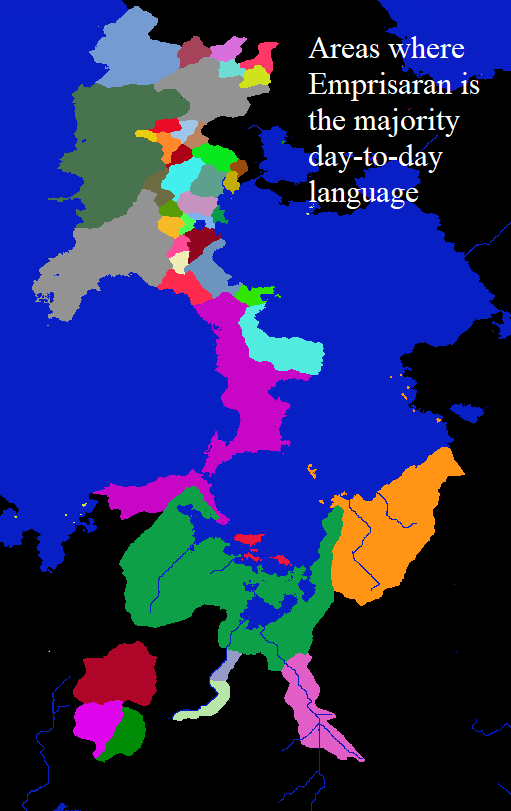Emprisaran Language
Emprisaran is a language connected to the sacred Druidic tongues. It is the language of Gods, preferred for religious writing across Pratasam, Areto, and Halikvar. It is also the language of naming and of trade across much of Samvara.
In Garadel, Emprisara is the language of the Pratasam trading group and is considered the default 'Samvaran' and 'druidic' language. Globally, Emprisaran is considered something of the "language of the earth", and is believed to be sometimes understood by wildlife. Naturalists far from Samvara who wish to appear worldly and mystical will sometimes write their works in Emprisaran. Many druidic schools also use Emprisaran to teach classes, as many traditional exercises and mantras use this tongue.
Emprisara is very closely related to two other major language groups: Ekedian and Dawaran.
Gender is a lie, just modify things however.
Generally speaking, Emprisaran is a mashup of Sanskrit and Hebrew. While these are linguistically mulched beyond most recognition, you could probably dabble a bit in either for names or words, but be careful - both have very distinctive sounds and names. Walking around with Mister Abraham Bodhi Brahma as your archdruid name might be disorienting for some players.
Emprisaran Names
- Mushaba (state of joy)
- Yarja (Moon-borne)
- Neesonita (Endless victory)
- Samaya (Made of heaven)
- Rashaji (Conqueror of Evil)
- Adami (One who resides in Earth)
- Galima (Exiled One)
- Suma (Blessed one)
- Veshi (Rain)
- Hasab (Lord of Laughter)
- Namika (possesses the river)
- Eva (beloved)
- Kirika (posses the law)
- Shalaba (state of safety)
- Donshaji (conqueror of punishment)
- Takaba (bat)
- Azeja (boar-like)
- Kavuji (conqueror of the grave)
- Grifeba: (born of the book)
- Nasaya (made of breath)
- Rokalaji/Okalaji (conqueror of disease)
- Suprata (blessed promise)
- Baraja (born of lightning)
- Kaineka (spear-wielder)
- Markara (spider)
- Nadara (river)
- Sukata (blessed parent)
- Efneba (state of fire)
- Akanja (born of the omens)
- Kemava (endures chaos)
- Rahaja (big person)
- Azetaji (conqueror of all)
- Kemiseb (endures drought)
- Goresh (eagle)
- Tomaba (bison-state)
- Artaja/Artoja (good person)
- Tulimeen (crocodilian)
- Ibaja (beloved child)
- Koshvala (temple dweller)
- Goraji (conqueror of bulls)
- Sutenia (blessed fighter)
- Aniaja (bird person)
- Sumet (the needle)
- Rindvala (desert dweller)
- Inaja (owl person)
- Perna (butterfly)
- Arnika (horse owner)
- Esavi (lion)
- Suhara (blessed multitude)
- Saraji (conqueror of serpents)
- Merja (deer person)
- Gipika (cow owner)
- Litija (born at night)
- Yonja (born at day)
- Imadja (middle-born)
- Sumeta (blessed truth)
- Losa (fox)
- Apna (hope)
- Emeji (conqueror of fear)
- Zankara (obedient)
- Sura (listener)
- Useba (spring)
- Idwa (cat)
- Kalma (one who is dog)
- Zaraja (came from a seed)
- Devi (grass)
- Telim (moss)
- Keshwan (black flower)
- Artawan (green flower; youth)
- Dwawan (red flower)
- Sevwen (white flower)
- Zevren (gold flower)
- Suswep (blessed lily)
- Veshima (one who is rain)
- Etesma (one who is tree)
- Suzara (blessed seed)
- Sahmsen (heaven's roots)
- Ahkzara (omen-seed)
- Lushaba (state of growth)
- Pesha (light leaf)
- Kiasa (root of law)
- Koposen (deep-rooted)
- Farwen/Farwan (fire-flower)
- Artapi (good leaf)
- Rebema (of abundant pollen)
- Oyena (orchard child)
- Arthhalsa (praises Halcyon)
- Swenaya (made of lilies)
- Arshepra (praises Shepara, god of the sun)
- Kosama (power of heaven)
- Koswep (power of lily)
- Swedwa (lily of red)
- Heskiba (of the covenant)
- Vanra (of the path)
- Dawarja (of the Dawara, the sacred tribe of Lily)
- Sanadja (of Sanadi, the river goddess)
- -aya: made of
- -aji: conqueror
- -ja: born of, person of
- -aba: state of
- -var: family
- -ma: one who is
- -hika: possesses
- Kem-: endures
- Ko-: power of
- -onita: endless
- Su-: blessed
- -bar: earthly
- -abha: creature
- -vala: dweller
- -bu: master
- -var: family of
- Koshavar (temple family)
- Mahtwara (tribe of riches)
- Baranvar (family of lightning)
- Alkovar (family of druids)
- Sharwara (comet clan)




Comments